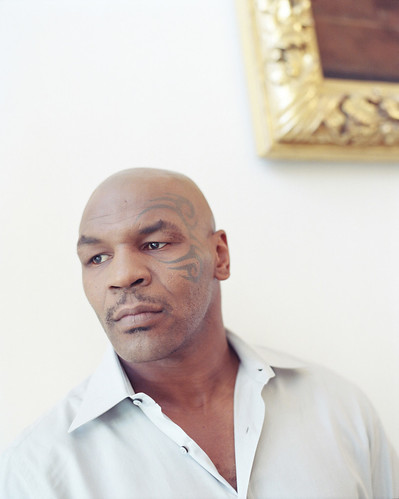 The idea of spending 90 minutes alone with Mike Tyson probably scares most people half to death. But "Tyson," the new documentary by James Toback about the infamous boxer, surprises with its fascinating portrait of a compelling and unexpectedly sympathetic figure.
The idea of spending 90 minutes alone with Mike Tyson probably scares most people half to death. But "Tyson," the new documentary by James Toback about the infamous boxer, surprises with its fascinating portrait of a compelling and unexpectedly sympathetic figure.The movie is essentially the audience alone with Tyson, looking directly into the camera and talking about his life. There is some archival footage, old photographs and home movies. But for the most part it's just the man, talking unblinkingly about the rage inside him, and how he's struggled -- usually unsuccessfully -- to master it.
Toback (who last directed the tidy erotic thriller "When Will I Be Loved" starring Neve Campbell) employs overlapping split-screens as he weaves together more than 30 hours of footage of the ex-champ. Even though Toback has known Tyson since he was 19, the director wisely does not impose himself in the picture. Rather than appearing as interlocutor, Toback provides the answers while eschewing the questions.
That's why the film has such a confessional feel to it -- a man trying to make a new start in life by unburdening himself of his grotesque past.
The Tyson we see before us barely resembles the 20-year-old who became the youngest heavyweight champ in 1986. Gone are the gold teeth, '80s fade haircut and playful public persona. Tyson is older, lumpier, and with the Maori facial tattoo he got an a whim, he resembles a grizzled junkyard dog with a jigsaw face. The brutal physique that earned the label "Iron Mike" is gone; when he pulls up his shirt to reveal another tat he got while in prison, his belly lops over his belt.
Right away, he startles us by revealing that he was a shy kid who was bullied and robbed in his rough neighborhood. He took to boxing, and later to street thuggery, as a way to protect himself, psychologically as much as physically.
The relationship with elderly trainer Cus D'Amato, who died right before Tyson won his first belt, is fleshed out satisfyingly, despite being a familiar story. Many have wondered, as Tyson himself does, if he still would have wallowed in the excesses of sudden fame and fortune if his mentor were around a little longer.
Tyson also touches on his short-lived marriage to actress Robin Givens, a public spectacle that he takes responsibility for, while deflecting some of the more outrageous claims.
The infamous ear-biting of Evander Holyfield is explored in full. While not in any way excusing himself, Tyson's account shows how some foul tactics by his opponent, coupled with Tyson's feelings of persecution, drove him to "just want to inflict pain" -- simultaneously degrading himself and his sport.
Interestingly, the one misstep Tyson refuses to acknowledge is his rape of a Miss Black America contestant in Indianapolis, for which he served three years in prison. He refers to the victim as "that wretched swine of a woman." Why he would freely admit to all the other shameful things he's done in his life, from robbery to drug abuse, without confronting this one, is perplexing.
But that's the often mesmerizing portrait we see in "Tyson," a contradictory figure who went as high and low as one can go in his sport, and in life.
3.5 stars
No comments:
Post a Comment